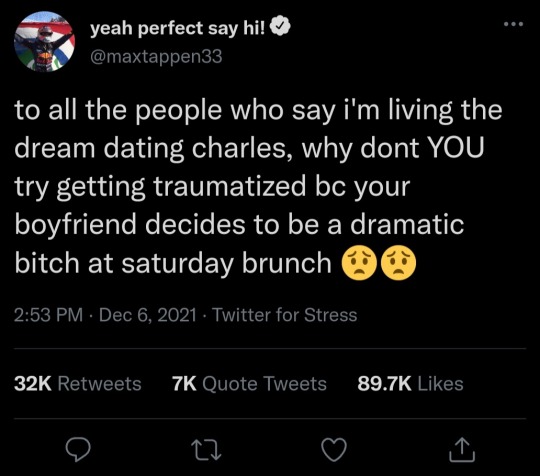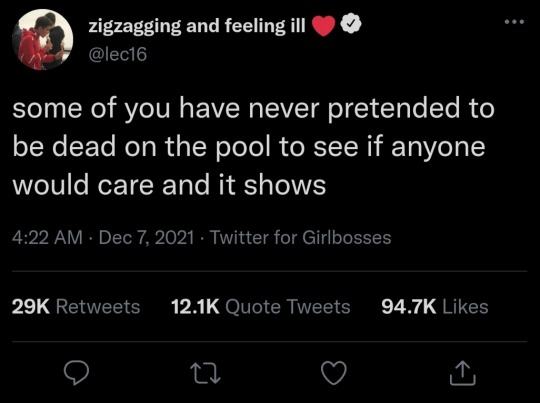#says alot about my state of mind pre-race that i brought this back from the dead LMDDKJD
Text


#says alot about my state of mind pre-race that i brought this back from the dead LMDDKJD#lestappen#charles leclerc#f1#formula one#incorrect f1#max verstappen#red bull racing#scuderia ferrari#lestappen on twitter#33 + 16
168 notes
·
View notes
Text
Blade Runner 2049: Thoughts and Critique?
A few weeks ago (11/2/17 if Tumblr doesn’t time-stamp these posts) I saw the film Blade Runner 2049, the sequel to the 1982 ‘flawed masterpiece’ of the same name minus the date.
And much like it’s predecessor it’s a flawed film, however those flaws are much more present that I wouldn’t call it a masterpiece; but it isn’t bad, it’s actually quite good, so much so that it definitely sticks out when compared to many modern films based on pre-existing franchises or iconography.
This film is frustrating, to put it bluntly. Frustrating because it’s a mixture of being both excellent, alright, and at some parts bad.
I haven’t posted jack-squat on this blog in ages, and my ability to express and articulate viewpoints hasn’t had much opportunity to be refined well, so consider this a warning that this kind of opinionated, and I wouldn’t fully call it a critique. Also this will be riddled with spoilers, so if you plan on watching this film to make up your own mind (which I would highly encourage), please don’t read this until doing so.
Overall I thought the film was good, but there were so many flaws that I wouldn't call it great. Many of those flaws act more like trade-offs from the original film that were worked differently in the new one, which do and don't work.
Visually it's really impressive, with director Denis Villeneuve knowing what to focus on in each scene and how the lighting, color composition and blocking help establish tone and flow the film through. However the original film had so much visual detail in it that your eyes were allowed to wander wherever with what felt like a vast but cluttered, overused and believable world. The new film feels almost empty at times, crowd scenes don't feel crowded, and the lack of background detail and constraint the director puts on you don't allow you to wander that much; the camera confined, but only because it knows what to focus on.
The scene of them flying to Wallace's building as it towers over the pyramids of Tyrells' in a rainy fog while a Tibetan choir sings genuinely chilled me.
Which leads me to the music which was also great, when it's there. It's nice that the composer tried something close but also distinct from the original film's score, but most of the music is this loud thunk noise; it doesn't sound as varied as the originals, nor does it get baked into the film as well.
The plot was simple but well-defined, some of the characters were good and well-defined (some of them), and the actors who played them did a good job performance-wise. Deckard in the original only did one-bit of 'detective-work', but K is a genuine detective in this new film, doing a great deal of work to solve this mystery of sorts; it does bite him hard by the film's end, which was smart and to me unexpected.
And yeah, the way women were in this film was unusually distracting, namely because it had so much presence in the film's plot, and as consequence affected the overall feel of the film. I liked Robin Wright's character, and I kind of like Luv when she wasn't in the presence of Wallace Breen. And yes, the scene when we first see him felt almost unnecessary, like it told you that "here the bad guy does something bad to tell you he is bad guy", when his ambition and goal was enough already, we don't need to see him make out with a naked woman and then kill her right after; my mom described this part as "voyeurism", and my parents' dislike for this movie is far stronger than anything I can say.
As for Karen (I know it's Joi, but she condemned herself as Karen the moment she brought out the holographic meatloaf), this was the most distracting thing about this movie, namely because she had so much in it, yet gave so little outside of being a motive for the male leads actions. The scene where she melds with the prostitute to have a three-way, while visually cool my man-ass will admit, inappropriate story-wise. Like Ryan thinks he's a born replicant, fails his Voight-Kampff test, and then has sex? I couldn't believe that, as I watched this scene in the theater, I was preferring the grubby, uncomfortable love scene in the original Blade Runner; because unlike this one, that scene between Deckard and Rachael had some sort of an odd context in the film, and was also appropriately-timed as well.
The part where they brought back Rachael to torment Deckard, after parading her skull around was cruel, but it's placement in the film is interesting because it does address a question the Final Cut of Blade Runner brought up: Is Deckard a replicant or not? They don't answer it, they leave it, toss it around actually. And it gives a pausing moment where Deckard says only one line: "I know what's real.............."
In the ending of the 2007 Final Cut of Blade Runner, Deckard finds an origami unicorn in his apartment, an image he saw in a daydream earlier in the film. They don't give a direct answer as to what Deckard is, they only hint and prod but never define. This twist ending is hailed by so many people as for making up a great majority of the original film's unsatisfactory 1982 version; it's far better than any 'happy ending', that's for sure.
But here's the thing: this man, whose profession is hunting down and killing people who have been defined as not real, who has been nearly killed by those who know they are not real , and has fallen awkwardly in love with someone who he knows and who she now realizes is not real, has now come to possibility that he himself may not be real. What does he do?

He accepts it. We don't know what he accepts, but whatever it is, he simply moves on.
And while Blade Runner 2049 may not follow this theme of accepting ones' reality to its' exact beats, it does what this film does in a whole and takes parts of what the made the original film work and expands on them with some strengths and weaknesses everywhere.
K knows his implanted memories are fake, yet accepts them as the bedrock of his identity, regardless of the slave-like state he lives in society. It's only when he begins to question whether he was born or not that he becomes more erratic, until it eventually leads the great detective to assumes the role of somebody he is not. It's why the twist near the end when we realizes that the child was a girl and not a boy like he assumed is so effective; K did far great a deal of intuitive detective work in this film, and yet even he misses out on what were some vital clues to fit the possibility that he may be more than what he is, whether he likes it or not. And it's only when he's in-front of that gratuitous billboard, when not-his-Karen calls him something only his-Karen could, that he accepts what he is, and goes to save Deckard.
It's not just him, but alot of the other characters here display varying takes on this theme of acceptance. Joshi half-heartedly accepts her death along with the possibility that K lied to her, Luv without choice accepts her dual position as the high-end of a massive corporation while being a slave to that corporations' leader, and even Wallace, literally blind in his grasp for power cannot accept his nor humanity's limitations and thus seeks a born race of slaves to fulfill his desire. Even the underground revolution of replicants, who show up for only a few minutes of a near three hour movie, consist of those who cannot accept their place in society because it is that of a slave.
Blade Runner 2049 is a flawed film, but it's still a good one despite some shortcomings and frustrating choices throughout. It walks away from the long line of passable films modern Hollywood has been rolling out with an established franchise attached to it, but only a few feet. Overall, it's a short step in the right direction.
2 notes
·
View notes